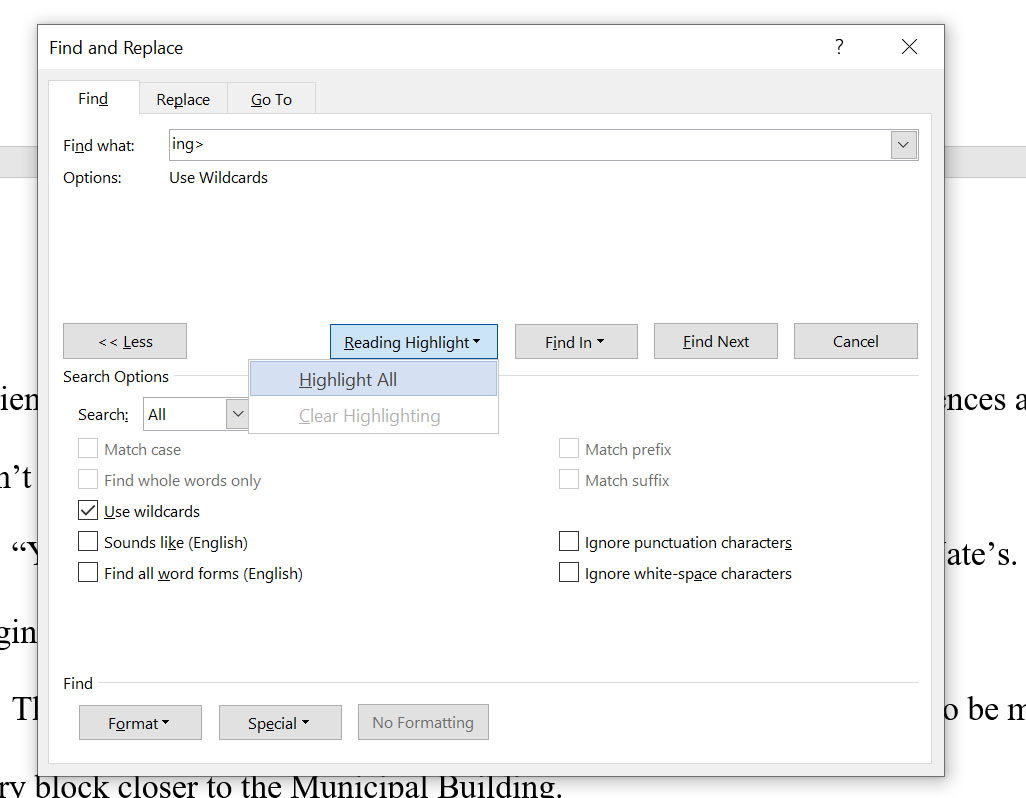Beware the “ING” Construction
Terry Odell
 I know this topic was mentioned recently, and apologies for not being able to find the post to credit the author. Perhaps it came up in the comments. No matter the source, I thought this craft topic worth another look, especially after a recent read.
I know this topic was mentioned recently, and apologies for not being able to find the post to credit the author. Perhaps it came up in the comments. No matter the source, I thought this craft topic worth another look, especially after a recent read.
We all have our favorite sentence construction. For the author in question, the book was overrun with sentences starting with gerund phrases – those “ing” words.
At the very first writer’s conference I attended, an agent said she would reject a query with more than 1 sentence beginning with the “ing” construction. Her explanation—it’s too easy to make mistakes with that sentence structure.
What mistakes? We’ve been told that construction with “was/ing” is a sign of weak writing. He was running. She was dancing. It’s stronger to say “He ran” (or sped, or rushed). Or “She danced” (or pirouetted, or waltzed, or sashayed) But there are more ways overusing gerunds can get you into trouble.
Dangling and misplaced modifiers. (Note. You don’t have to be able to know which is which, as long as you know they’re wrong and how to fix them.) A misplaced modifier is too far away from the thing it’s supposed to modify, while a dangling modifier’s intended subject is missing from the sentence altogether.
First, the misplaced modifier. In my first crit group, I held the prize for creating an answering machine that gave neck massages. I’d written, “Rubbing her neck, the blinking red light on the answering machine caught Sarah’s eye.” Ooops. (But I would like a machine with that function!)
Make sure the noun or pronoun comes immediately after the descriptive phrase. Thus, the above example could be “Rubbing her neck, Sarah noticed the blinking red light on the answering machine.”
And example of a dangling modifier: “Walking into the room, the smell was overpowering.” Corrected, it could become, “Walking into the room, they encountered an overpowering smell.”
Next, and the one this post-inspiring author was most guilty of: the non-simultaneous action. “Running across the clearing, John dove into the tent.” Or, “Opening the door, Mary tripped down the stairs.”
John can’t be getting into the tent while he’s running across the clearing. And Mary needs to open the door before she goes downstairs.
When you’re looking over your manuscript, you might want to flag words ending in “ing” and take another look to be sure you haven’t made any of these basic errors.

If you’re using Word, you can do a “find” using wild cards to flag words ending in “ing.” In Word, which is what I use, it’s Edit/Find/More. Then check the “use wildcards” box, and then special, where you’ll find the command for end of word, which is the > symbol.
That means, you should type ing> into the search box. Then you can either look at them one at a time, or check the “highlight all items found in:” box. True, you’ll get words that aren’t gerunds that end in ‘ing’ – thing, building, etc., but it’ll give you a place to start.
Any examples to share–from your own reading or writing?
 OK, one more thing, a brag moment. The Mapleton Mystery Novellas was selected as a top pick for 2020 at Kings River Life Magazine.
OK, one more thing, a brag moment. The Mapleton Mystery Novellas was selected as a top pick for 2020 at Kings River Life Magazine.
 Are Gordon’s Days in Mapleton Numbered?
Are Gordon’s Days in Mapleton Numbered?
Now available for pre-order. Deadly Options, a Mapleton Mystery/Pine Hills Police crossover.
Terry Odell is an award-winning author of Mystery and Romantic Suspense, although she prefers to think of them all as “Mysteries with Relationships.” Follow her on Facebook and Twitter.

Terry, thanks so much for this terrific post! The “—ing” construction is something that writers might do and not even be aware of it. I’ll certainly watch for this more closely in my own writing.
Congratulations on your brag moment and good luck with DEADLY OPTIONS!
Thanks, Joe. I recall this coming up some time ago, and a multi-published, popular mystery author said she was totally aware of the “simultaneous action” caveat, so I figured it might be timely for authors at all levels.
Saving this! Thank you, Terry, for making this so clear. When I finish a draft of my writing, I search out the -ing words, but I’m not always sure which ones to keep and which ones to nix.
Hope it helps when the time comes. One of my crit partners is British, and apparently their school system is more rigorous than ours when it comes to grammar. He’s a godsend.
Good tips, Terry. I hadn’t thought of using wild card search in Word for “ing.”
Thanks for that!
Thanks, Debbie. There are all sorts of hidden ‘secrets’ in Word. I’ve barely scratched the surface. I love finding new ones that help clean the manuscript.
Reading your post, the caution becomes quite clear.
Snort. But good example.
Great post, Terry. Thanks for the tips on using Find in Word. That was very helpful. You wrote that you enjoy finding hidden secrets in Word. Do you have a source for those secrets, or do you just explore?
Congratulations on the Mapleton Mystery Novellas being selected as a top pick for 2020. Good luck with Deadly Options.
First, thanks, Steve.
No secrets, for my Word tips, although I’m sure there are tutorials, books, websites that have all sorts of helpful bits. Mostly, I explore. There are all those neat things you can click, boxes you can check, and I love to play. When I find something that helps me, I share.
Thank you for explaining wild cards, Terry. I’ve never used that feature.
Glad you discovered something new, Sue.
In my very first critique group, I had a partner who used to tell me the Ing Monster was following me. I didn’t understand fully at the time, and “Glee” wasn’t good at explaining. I didn’t learn what she meant until much later, with a much stronger critique group!
Having the right people help you improve the writing is the best reason to be in a critique group. Glad you found one that’s working for you.
Wow, instant story improvement. I’ve just started a new story with about 1200 words written. I tried your technique and KAPOW, better sentence structure. Thanks.
So glad it helped, Alec, and thanks for stopping by to let us know.
Congratulations on your Mapleton Mystery awards, Terry!
Misplaced and dangling modifiers can be so funny. I saw this example of a newspaper headline:
“Miners refuse to work after death.”
Here’s my entry: Dangling at the beginning of the sentence, he corrected his misplaced modifier.
Thanks, Kay. Nothing like zombie miners to keep things moving. Good example, and thanks for sharing.
I call it Ing the Merciless. (FLASH GORDON reference.)
In my early days of writing, much of my sentence structure rewriting was changing up too many character noun (I, he, she, Fred) then verb sentences so those “ing” openers were a good go-to. They weren’t, most of the time.
Since then, I’ve figured out that my weakness was in viewpoint rather than sentence structure. “She scrunched her nose at the rotting smell and tried to look away from the body in her living room” shouldn’t be rewritten as “Trying to avoid looking at the body in her living room, she scrunched her nost at the rotting smell,” because both weren’t in tight viewpoint. They were outside looking in. I wrote, “Rotting meat stench hit her. Her scrunched up nose helped, but she couldn’t force herself to look away from the body in her living room.”
You make an excellent point, Marilynn. Too often we try to retain as much of the original as possible, be it sentence, paragraph, or scene, when the ‘real’ solution is to start from scratch.
Good stuff, Terry. Thanks for reminding me about “ings”. And thanks for the Wildcard feature tip. The more I use Word, the more I’m realizing how much I don’t know about it.
Thanks, Garry. I’m always finding something new about the programs I use. Anything that makes my life easier is a plus.